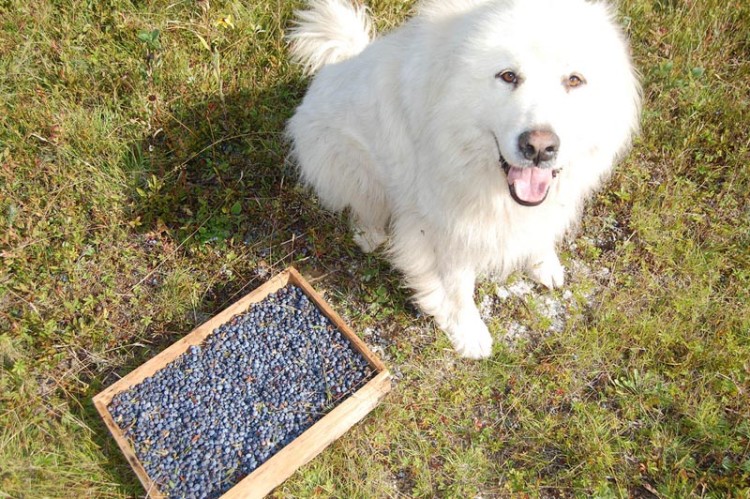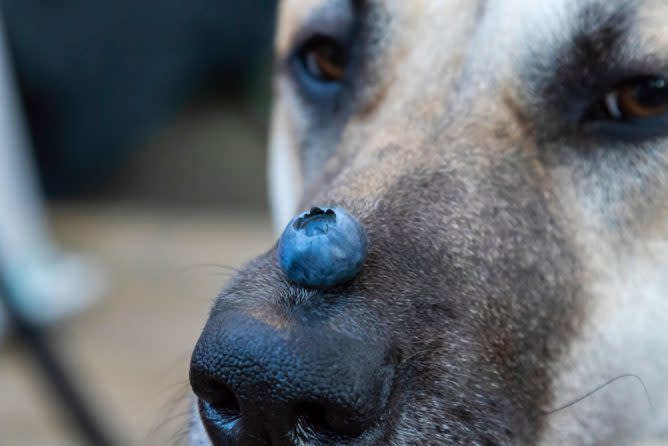We know that blueberries are great for humans, but can our canine companions safely eat them? The answer is yes, blueberries are good for dogs, as well. All the vitamins, antioxidants, and fiber blueberries are known for providing the same benefits for your pet’s body that they give yours.
However, as with all human foods, too much of a good thing can be a bad thing. While these berries are beneficial in moderate amounts, too many of them might result in gastrointestinal (GI) upset.
In this post, we’re exploring what makes blueberries so great and what are the best ways to include them into your pet’s diet.
Table of Contents:
- Health benefits of blueberries for dogs
- When are blueberries bad for dogs?
- How many blueberries can dogs eat?
- How to feed blueberries to your dog
- Are other berries safe for dogs?
- Which berries are bad for dogs?
- Key Takeaways
Pro tip: With pet insurance coverage, you can get reimbursed for the costs of major and minor illnesses, such as arthritis, cancer, hypothyroidism, gastrointestinal issues, and more. It can cover expenses for everything from diagnosing the health condition to the treatment your dog needs to get better.
Health benefits of blueberries for dogs
Blueberries are chock-full of vitamins and minerals and are also believed to have one of the highest antioxidant levels of all common fruits and veggies. What’s more, blueberries are rich in dietary fiber, contain anthocyanins and phytochemicals, and are low in calories. All these nutrients are working together to provide optimum health for your four-legged friend.
Let’s take a closer look.
-
Antioxidants. These small purple berries are best known for their antioxidant properties. Antioxidants fight harmful free radicals responsible for cellular damage. Studies have found that adding blueberries to a dog’s diet reduces the recovery time after heavy exercise. This can be an important benefit for active dogs, as well as for senior dogs as it might increase their mobility. Blueberries can also help slow down the aging process and cognitive dysfunction in older dogs.
-
Vitamins. Blueberries contain Vitamin C, Vitamin A, and Vitamin K. These vitamins work to improve your pup’s immune system, reduce inflammation, support the proper function of the muscles, bones, and nerves, and improve the quality of your pup’s coat and skin.
-
Minerals. Phosphorus, calcium, magnesium, and potassium all have a role in supporting bone growth and improving the body’s ability to absorb nutrients more efficiently.
-
Anthocyanins are responsible for the color of blueberries. They work together with antioxidants to reduce the risk of arthritis, diabetes, cancer, and heart disease.
-
Phytochemicals are linked to several health benefits for both dogs and humans. Studies have found that phytochemicals can reduce chronic inflammation and help with some types of cancer.
Due to the various health benefits, many dog food manufacturers have included blueberries in their dog food formulas. Compared to other fruits, these purple berries are relatively low in sugar, which makes them appropriate even for diabetic dogs. However, it’s always best to consult a vet before giving them to pups with any health condition.
 (Image source: American Kennel Club)
(Image source: American Kennel Club)
When are blueberries bad for dogs?
While blueberries are generally safe for canine consumption, that doesn’t mean that they don’t come with some risks. Here’s what you should pay attention to:
-
Choking hazard. Blueberries are soft and small, so they don’t present a choking hazard. However, if frozen, they become hard and might be dangerous for small breed dogs. The risk can be avoided by simply making sure that the blueberries are defrosted before serving. If you’re worried that blueberries might present a choking hazard for your pup, or if your dog is allergic to them, you could opt for other fruits that are just as tasty. Some foods that are larger and require more chewing include watermelon, pineapples, and peaches.
-
Stomach upset. Blueberries contain high levels of dietary fiber, so too many of them can cause diarrhea and stomachache, especially if they haven’t been checked for mold and cleaned before serving. For this reason, you should be extra careful if you grow blueberries in your backyard where your dog has access to them. Blueberries can make a tasty treat for your dog but should only be fed in moderation.
-
Allergies. Just like people, dogs can also have food allergies. If you notice any allergy symptoms such as diarrhea (or any other GI issues), chronic gas, or ear inflammation, be sure to talk with your vet.
-
Artificially blueberry flavored products should not be given to dogs as they contain preservatives, chemicals, added sugar, and other substances that can cause stomach upset. For these reasons, you should avoid giving your furry friend commercially prepared blueberry muffins, blueberry pie, blueberry yogurt, blueberry pancakes, etc.
Pro tip: While the cost to treat an upset stomach will probably not break the bank, more serious health problems can cost several thousand dollars. If you don’t have pet insurance and can't afford emergency costs, you could be faced with a difficult decision. That’s why you should make sure to enroll your pet as soon as possible.
 (Image source: PetGuide)
(Image source: PetGuide)
How many blueberries can dogs eat?
As with all human foods, moderation is key. Treats should make up no more than 10% of your dog’s diet and should only be given on occasion. For smaller pups, 10 blueberries should be enough. Larger canines can safely eat more blueberries, but keep the ratio of 10% in mind when serving them.
Introduce blueberries into your pup’s diet slowly to measure any negative effects on their health.
How to feed blueberries to your dog
Blueberries are very versatile, and most pups love indulging in them.
- When serving fresh blueberries, make sure to rinse them in water and check for mold before feeding them to your four-legged friend.
- As frozen blueberries can present a choking hazard, you could defrost and mash them before serving. If you’re feeding frozen blueberries, offer 1-2 at a time and keep an eye on your pet while they’re eating them.
- Combine some mashed or pureed blueberries with plain yogurt. Pour the mixture into ice cube trays and freeze for a refreshing snack on hot days.
- Add blueberries to fruit salad along with bananas, apples, and other favorites.
Are other berries safe for dogs?
Are there any berries that your pooch shouldn’t eat? Yes, some of the berries found in the wild are toxic to both humans and dogs. That being said, the berries consumed by humans are also safe for dogs.
 (Image source: DogTime)
(Image source: DogTime)
Strawberries
Most of the nutrients found in blueberries are also present in strawberries. Strawberries are rich in Vitamin C, antioxidants, and dietary fiber. However, the presence of fructose could lead to increased blood sugar levels in your furry friend, which is why strawberries should be served in small amounts.
Cranberries
Both raw and dried cranberries are safe to feed to canines in moderate amounts. But due to their tartness, your pooch might not enjoy the taste of these berries.
Raspberries and blackberries
These two berries are rich in vitamins, minerals, and antioxidants that have a positive impact on your dog’s health. Blackberries also contain Omega-3 fatty acids which help promote a soft and shiny coat. Also, blackberries are higher in vitamin K and sugar, so your pooch might favor them over raspberries because of their sweetness.
Which berries are bad for dogs?
While the berries commonly sold in supermarkets are safe for canine consumption, there are some wild berries that your pet shouldn’t eat. These include baneberries, juniper berries, and pokeberries (which are similar to grapes). Even though these berries aren’t fatally toxic, they can lead to digestive problems or other health issues. To prevent your dog from ingesting toxic wild berries, be sure to pay close attention to them when outdoors or on hikes.
Pet owners should also be careful with decorative berries like holly berries and mistletoe. These are commonly found in homes during the holiday season, so you should make sure they’re out of your dog’s reach.
Key Takeaways
- Blueberries are delicious treats that contain many health benefits for dogs.
- As long as you portion them appropriately and watch for potential adverse reactions, your dog can eat blueberries safely.
- If you have any questions or concerns about feeding blueberries to your pet, make sure you talk to your veterinarian.
